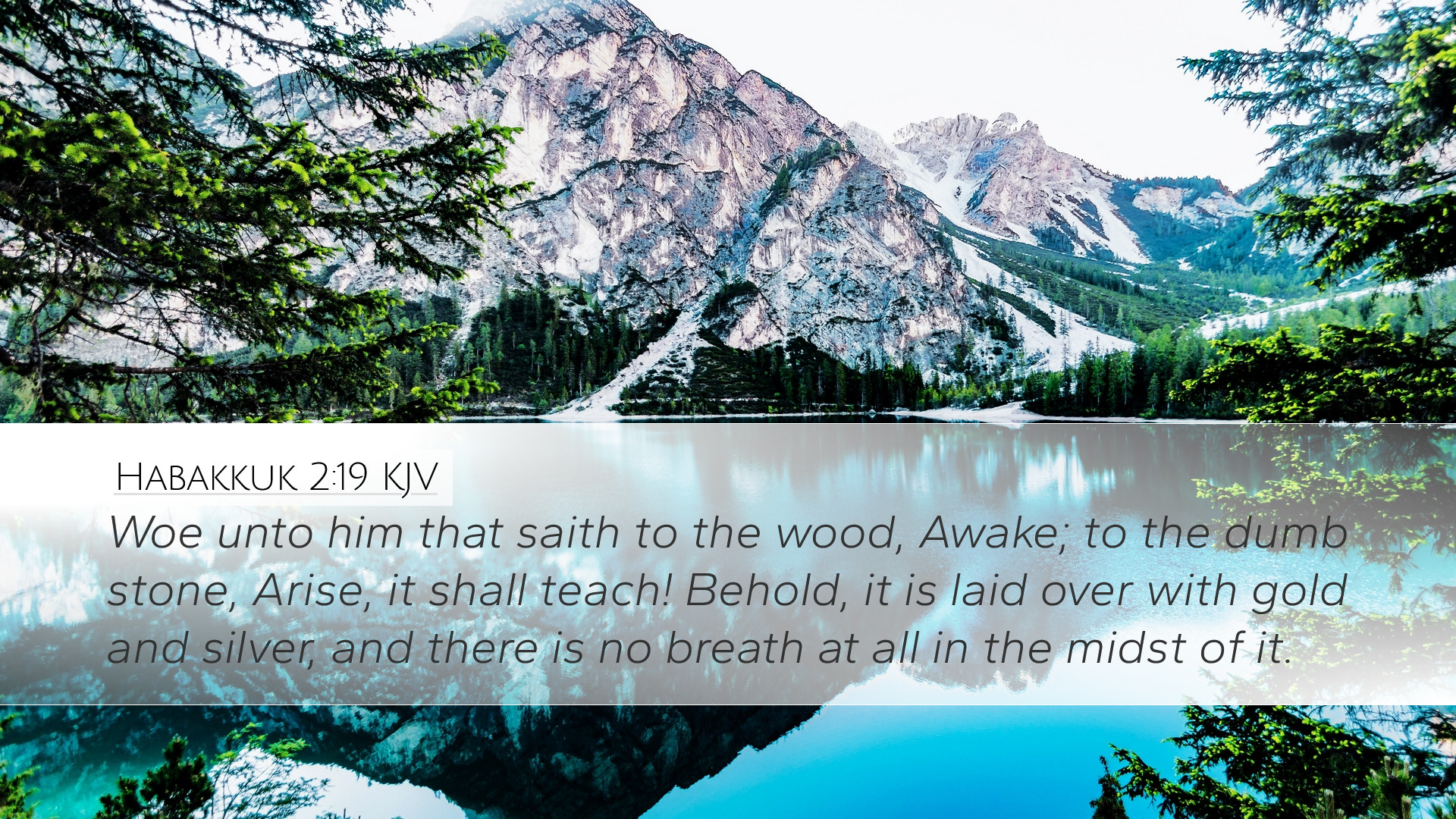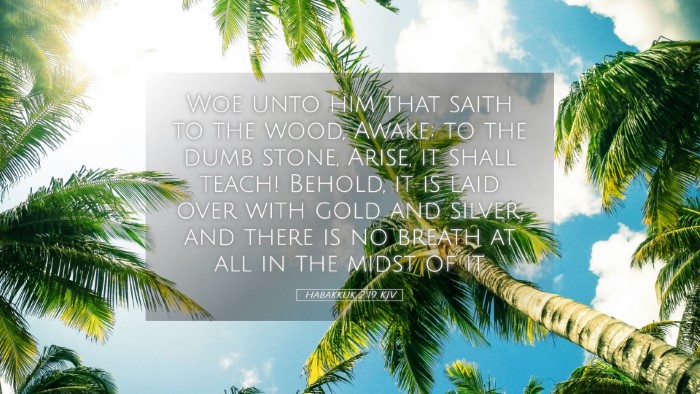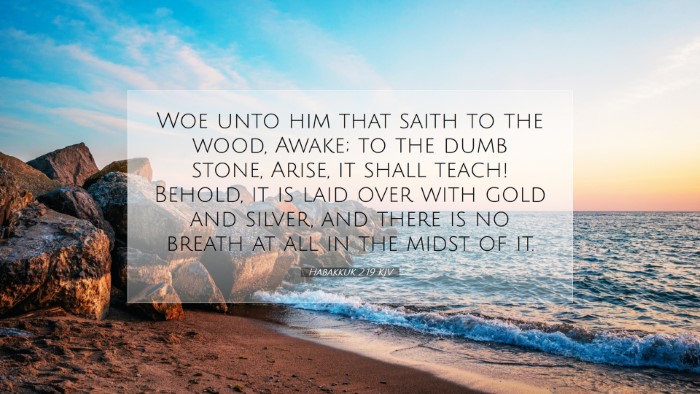Old Testament
Genesis Exodus Leviticus Numbers Deuteronomy Joshua Judges Ruth 1 Samuel 2 Samuel 1 Kings 2 Kings 1 Chronicles 2 Chronicles Ezra Nehemiah Esther Job Psalms Proverbs Ecclesiastes Song of Solomon Isaiah Jeremiah Lamentations Ezekiel Daniel Hosea Joel Amos Obadiah Jonah Micah Nahum Habakkuk Zephaniah Haggai Zechariah MalachiHabakkuk 2:19
Habakkuk 2:19 KJV
Woe unto him that saith to the wood, Awake; to the dumb stone, Arise, it shall teach! Behold, it is laid over with gold and silver, and there is no breath at all in the midst of it.
Habakkuk 2:19 Bible Commentary
Commentary on Habakkuk 2:19
Habakkuk 2:19 states:
"Woe to him who says to a wooden thing, ‘Awake’; to a silent stone, ‘Arise!’ Can this teach? Behold, it is overlaid with gold and silver, and there is no breath at all in it."
Introduction
This passage critically addresses idolatry, using strong language to convey the futility of ascribing power to inanimate objects. Habakkuk, as a prophet, is delivering God's message regarding the absurdity of idol worship and emphasizing the profound difference between the Creator and created things.
Contextual Analysis
To understand Habakkuk 2:19, we must consider its context in the book of Habakkuk, which grapples with questions of divine justice and the problem of evil. The prophet is troubled by the wickedness he observes, and this verse is a part of God's response, highlighting the helplessness of idols compared to the living God.
The Woe Pronouncement
The phrase “Woe to him” denotes a curse or condemnation against those who trust in created things rather than the Creator. According to Matthew Henry, this signifies a strong rebuke for placing confidence in lifeless idols.
The Futility of Idolatry
Henry further emphasizes that the wooden and stone idols, despite their adornment with precious materials, are utterly incapable of teaching or providing guidance. True wisdom and understanding come only from God. Albert Barnes adds that secular authority or supernatural divination could not be expected from mere creations of human hands.
Idolatry in Ancient Context
The idolatrous practices that Habakkuk condemns were prevalent in the ancient Near East, where nations often crafted idols from wood and stone, attributing divine powers to them. Adam Clarke notes that such practices were not just foolishness but a profound insult to God, who alone is deserving of worship.
The Contrast with the Living God
In contrast to the lifeless idols, Henry notes that Yahweh is alive, omniscient, and capable of delivering true justice. This juxtaposition serves to reinforce the call to faithfulness in God amidst the surrounding idolatry.
Theological Implications
Habakkuk 2:19 elicits several theological reflections, particularly on the nature of God in relation to creation. The verse affirms God's sovereignty and the limitations of human attempts to capture the divine in material form.
God's Sovereignty Over Idols
According to Barnes, the impotency of idols exemplifies the futility of human effort to encapsulate God within tangible representations. This highlights God's transcendence, suggesting that He cannot be contained or defined through human constructs.
Call to a Living Faith
Adam Clarke suggests that this passage calls believers back to a living faith in God. Recognizing the limitations of idols should lead to a greater reliance on God's power and wisdom. True teaching and understanding are derived from the breath of the Almighty, not from lifeless substitutes.
Application for Modern Believers
For contemporary readers, this admonition against idolatry resonates in various forms. While overt idol worship may not be prevalent, cultural idols often present themselves in the form of materialism, success, and self-deification.
Identifying Modern Idols
Henry advises reflection on what we may inadvertently place our trust in, challenging us to evaluate whether our confidence lies in our possessions, status, or abilities, rather than acknowledging God's supremacy.
Encouragement for Faithful Living
Believers are encouraged to cultivate a faith that is vibrant and reliant on the living God. As illustrated in Barnes’ commentary, a life rooted in Christ liberates us from the chains of idolatry, allowing us to engage with culture without succumbing to its temptations.
Conclusion
Habakkuk 2:19 serves as a timeless reminder of the folly of idol worship. It calls believers across generations to recognize the living God as the ultimate source of wisdom and power. By embracing this truth, individuals can live in faithful obedience, finding true meaning and purpose beyond the empty promises of material idols.
In summary, both historical and modern interpretations of this verse consistently highlight the need for vigilance against idolatry and the importance of maintaining a faithful relationship with God, who is the foundation of all truth and wisdom.


